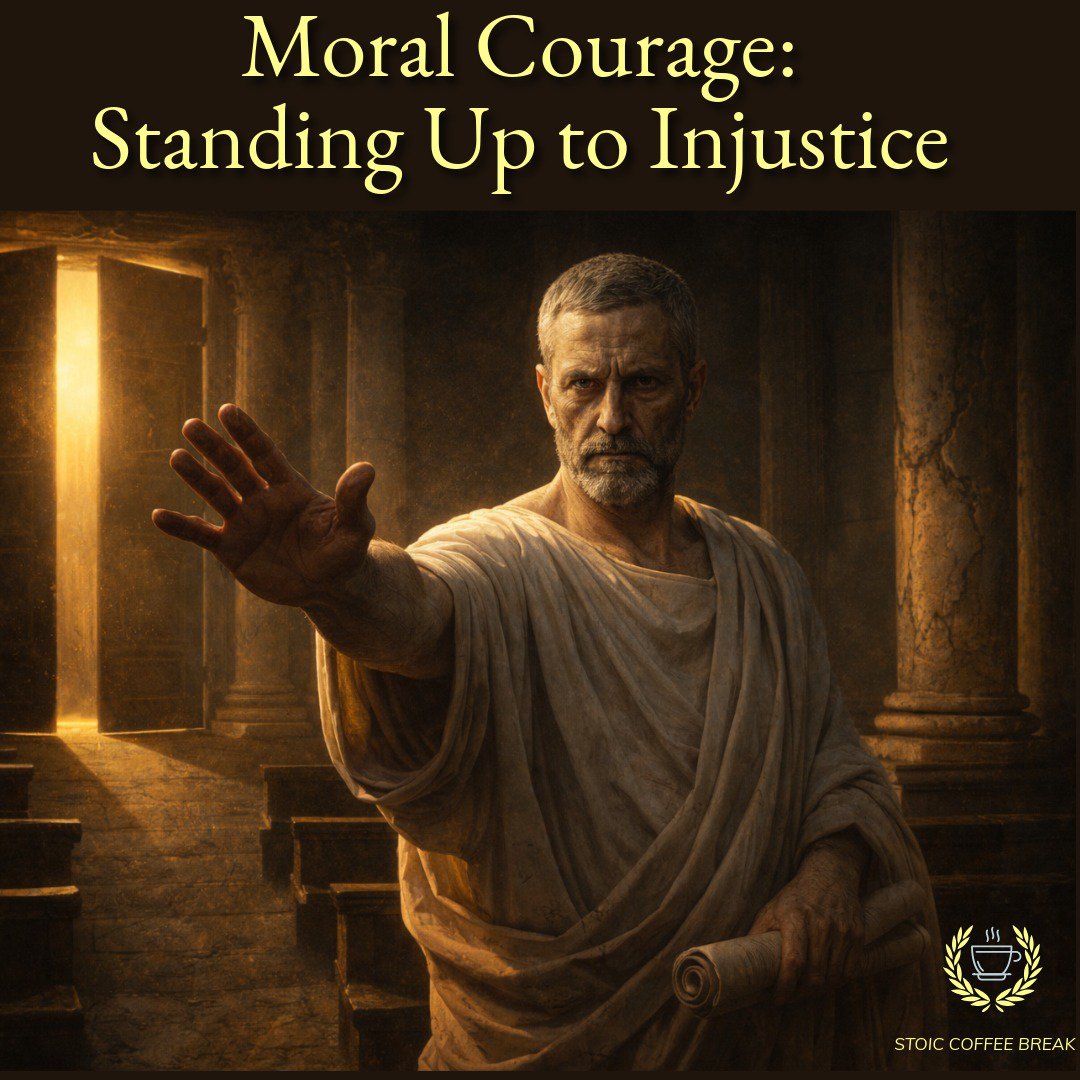
― Musonius Rufus
Do you struggle with mental health issues? Does depression seem like something that you can't shake? In this episode, I want to talk about some of the tools of stoicism, as well as some other tools that can help you build a stronger foundation to weather the dark times.
“The lamp of wisdom shines brightest when lit by the flame of self awareness.”
—Musonius Rufus.
So depression is something that seems to be endemic to humans of all stripes. Life is hard. We all have things that we struggle with. And while some people are lucky and seem to have the makeup that makes them more naturally resilient to the struggles that they face, others hit hard patches and feel like they're just barely keeping their heads above water, where everything is much more challenging than it is for others.
So, about 10 years ago, somebody very close to me, came to me because they were really struggling and they were contemplating committing suicide. It was shocking, but also I was very grateful that they came to me and we had a long discussion. We sat and talked for about three or four hours about all the things that we're struggling with and all the things that they were afraid to talk with anybody else about.
Fortunately this person (I'm not going to name names because I want to respect privacy) was able to get the help that they needed and turn their lives around. Every now and then I'll send them a text just saying, “Aren't you glad you stuck around?” And the answer is always, “Yeah, it did get a lot better.”
So that's one of the main reasons why I want to talk about this today is because I've had several people actually who have been hospitalized for severe depression. Luckily, and I count myself fortunate, they were able to, all of them were able to get through their struggles and reach that point to where they're able to manage their day to day lives and actually find happiness in lives.
And another reason why I wanted to discuss this topic is because I've had a lot of people send me messages about how my podcast is something that has been an anchor for them through the darker times in their lives. And I've even had some of them tell me that they were suicidal and that my podcast was one of the things that they could regularly listen to, to help them make sense about the chaotic nature and complexities of lives in a way that helped them to get their thinking back online and get to the point where they were more stable and actually finding some joy in life. For those of you who shared those, those stories with me, I'm very grateful that you trusted me with those stories. I'm grateful that my content has been helpful for you. I'm proud of you for the hard work that you've done to get to the point in your life where you're actually enjoying life and things are going better for you.
Genetic Predisposition
Now, some of the factors that lead to major depression are genetic. There's just no getting around that. According to the Stanford Medical Center, 40 to 50 percent of our predisposition for severe major depression is genetic. So if your grandparents or your parents suffer from severe depression, there's a pretty good chance that you will too.
Now, this isn't to say that if you fall into this category that you're going to live an unhappy life. It simply means that you have kind of started with a little bit of a deficit and it's something to be aware of so that you can make sure that you are taking steps in your life to manage those things, that you make sure that you are mentally healthy and that, maybe, if you need to, you seek therapy when things get a little bit dark.
So another aspect to consider besides the genetics is your natural disposition. Some people are more serious while others are a little bit more light hearted and jovial. Some people feel their emotions very deeply with higher highs and lower lows, and some are just more even tempered. Now, these traits are kind of baked into who you are, and can have a big influence on how you see the world.
General Outlook
I'd like to use some ideas from Arthur Brooks (, who is a Harvard researcher on happiness. Now I find some of these terms a little bit hard to follow, so I've used my own. But I think these are really good metaphors for us to use in order to think about mood and emotional temperament.
So on one axis you have emotional temperament. That means your fluctuations in your mood, whether they're higher or lower. On the other one is just your general mood or energy, being an optimist versus a pessimist.
So if you have what he calls a more positive energy mood with low fluctuation in your emotional temperament, then you are what he calls a Cheerleader. If you have a higher energy and a lot of fluctuation in your emotional temperament, meaning you have higher highs and lower lows, then you are a Mad Scientist. If you have low energy with a lot of emotional fluctuations, then you're a Poet. And if you're more low energy without a lot of fluctuation, then you're what he calls a Judge.
Now, these characteristics are just more of your general mood, and outlook, and how you see the world. Now, none of these is better than the other. They're just simply ways that you kind of view the world.
I took the quiz, and I was a Mad Scientist. Unsurprisingly. So that means that I'm generally optimistic about the world, but that my emotional levels tend to fluctuate quite a bit. I definitely have higher highs and lower lows. Now, even though I'm a Mad Scientist, meaning I have higher fluctuations of mood, I've been pretty lucky in that I've never really suffered from major depression. (You can find the quiz here.)
I do have a busy mind, and I often struggle with anxiety from time to time. There's a good chance that I have some ADD or ADHD, because I go through phases of being easily distractible or incredibly focused. But on the whole, I tend to weather things pretty well.
Low Days
But while I was working on this episode, ironically, I had one of my low days.
I woke up thinking that I slept normally, but found that I was super low energy, both physically and mentally. Life just felt kind of awful, and I couldn't think of anything in particular that was at the root of it. So I just took that day easy, and I didn't try to change my mood, but rather just let myself feel what I was feeling.
And normally, when I have days like this, going to the gym helps to reset things. But, I strained a muscle the other day at the gym, so I had to sit one day out. I did get out and do a few things, which helped me feel a little bit more productive about my day. And, fortunately, by the end of the day, the mood had passed.
So one of the things that I appreciate about Stoicism is that when I do have those low days, that it has been the thing that has helped me to kind of set a hard floor on those low times. I still feel them, but they don't have nearly the impact that they had when I was younger. So by developing Stoic objectivity, I'm able to recognize what I'm feeling and the thoughts that are leading to those feelings, and it seems to soften them.
It decreases their effect on me. I'm able to see them for what they are, and I'm rationally able to look at them with more objectivity, and with a lot more self compassion. It's like being able to see the whirlpool, but not being caught in it. So, what stoicism has taught me is that it's okay to feel the feelings that I'm having, and I don't have to fix anything.
And I also don't have to get swept up in those emotions. I can just let them be what they are and be curious about them. I can wonder why I'm feeling the way that I am. Not so that I can fix it or get rid of it, but so that I can understand it and give it some space. When you learn to accept the emotions that you're feeling and not resist them, you recognize that as painful as they are, feelings can't hurt you.
So I'd like to share some ideas that I came across while working on this episode, as well as some advice from the Stoics that can help you when you find yourself in a low space.
Self Awareness
The first thing, and I talk a lot about this on the podcast, is to become aware of your thoughts and your emotions so that you can manage them, rather than being swept up by them.
Recognizing that the thoughts you have are what create the emotions you feel was a huge revelation for me. Like most people, I'm I always felt or believed that the emotions that I had were simply caused by the things that were happening around me. Once I understood that my thinking around something was what was actually causing the emotions, I was able to learn how to manage my emotions in a much better way.
It's like Marcus Aurelius said:
“Everything we hear is an opinion, not a fact. Everything we see is a perspective, not the truth.”
—Marcus Aurelius
When you're feeling strong emotions, Look at the thoughts you are having about a situation. Write them down or talk about them. Getting them out keeps them from spinning around in your mind.
Ask yourself, “Are they rational? What is the story I'm telling myself? What meaning am I attaching to those thoughts?” Become an investigator of your mind. The more you can clearly articulate your thoughts, the closer you are to understanding what's going on. Why you feel what you feel. Donald Robertson, who was a guest on this podcast a few years ago, and author of How to Think Like a Roman Emperor, describes it like this:
“You can start training yourself in the stoic practice of objective representation right now by writing down a description of an upsetting or problematic event in plain language. Phrase things as accurately as possible, and view them from a more philosophical perspective with studied indifference.”
—Donald J. Robertson
Once you can know what thoughts you're having, it makes it a lot easier to change your thinking around a situation. You can recognize when you're having irrational thoughts. You can shift your perspective on something by changing what meaning you're giving to something.
Daily Routine
The next idea comes from an essay from Brianna Weiss book, 101 Essays That Will Change The Way That You Think. And she proposes that habits are a key driver of our moods. And at first I was a little bit skeptical about this idea, but the more she explained her thoughts, I found myself agreeing.
By setting clear habits and having a daily routine, we are able to create a psychologically safe place in our lives because we have familiar patterns that lead to expected outcomes. We often think that leaving things open and free gives us more freedom, and that that freedom gives us more control over our lives, but it's actually the opposite. By creating a structure in our lives, It actually gives us a greater sense of control because we are actually controlling what is within our power.
It also helps us to keep from getting so easily distracted, which often leads to feeling more out of control and being harder on ourselves for not accomplishing the things that we want. For those with ADHD, having a good routine is helpful for managing executive dysfunction, which is where you find it very, very challenging to make decisions. If you already have a routine, there are no decisions to make, since they've already been decided in advance.
Another aspect of developing a daily routine is that it conserves mental energy. Every decision that we make takes mental energy, even small decisions. This is why, for example, I prefer going to food carts or restaurants that have a small menu because it's so much less stressful to have limited options.
Creating a routine is the same idea. You're limiting the amount of options for what you can do in your day and saving your decision making energy for things that really matter. I like a quote that Will Durant wrote in summarizing some of Aristotle's teaching:
“We are what we repeatedly do. Excellence then is not an act, but a habit.”
—Will Durant
Setting up and following a routine is a very effective tool to help you manage things in your life, especially if you're at a low point. You don't have to muster the energy to figure out what to do. You only have to follow the plan you've set out for yourself.
One thing that helps is having a wake up routine. When you get out of bed in the morning, do something. Do some small things that help your day get started on the right track. Get up and make your bed rather than lying there and scrolling on your phone. Then move on to the next task.
For me, I make my bed. First thing. And then I do a 20 minute deep stretch yoga session. I do the same one every single day because it works really well and my body feels better. Then I make some coffee and have breakfast. Then I do my morning pages and I do this every day so that it sets up the momentum for the rest of the day. I feel like I've already accomplished something.
Get Physical
The next thing that I find helpful for dealing with depression or low points is to do something physical, going for a walk or run, lifting weights, or whatever activity you can enjoy can make a tremendous difference in how you feel.
I know that I often talk about how our mental stresses are caused by physical issues. And I've seen this to be true in my life. Humans are made to be active and in our increasingly sedentary world, it's easy to go for days or weeks without really using our bodies in a meaningful way.
Connection
The last point I want to talk about is to reach out and connect with others in a meaningful way. We're not meant to go through this life alone. And connection is one of the things that keep us mentally healthy. Leaning on others when you're struggling is not a sign of weakness, but rather a sign of courage and wisdom that you know when you need to ask for help and that you have the strength to do so.
And to be honest, I know that when my friends reach out to me when they're struggling, it's not a burden. It's a blessing. It's an honor. I feel grateful that they trust me enough to reach out, and that vulnerability actually deepens our relationships.
If you're really struggling with depression, get in touch with a counselor or a therapist. A good therapist can help you develop the tools you need to work through the hard times and get to a place where you can manage things better. In fact, many of the current therapeutic modalities are based on stoicism, such as CBT, Cognitive Behavioral Therapy, and ACT, Acceptance and Commitment Therapy. A good therapist can even help you get medication if you are really in a dark, dark place which can help you get to a place where you can manage your daily life while you work through a deep or sustained depression.
Conclusion
Life can be challenging and oftentimes overwhelming, but the Stoics have given us some amazing tools to manage our emotions and manage our minds and have more control in our lives and be more resilient. As we have progressed as a society, we've recognized the toll that mental health issues can take on people, and it's become much less of a stigma to reach out and get the help that we need.
Whether you struggle from some low days like most people, or you get hit by a stronger, more sustained wave of depression, just know that this is part of life. It's part of being human. There's nothing wrong with you. Develop some routines to help you get back on track each day. Learn to manage your mind, and most importantly, reach out when you need help, because we all need help to make it through the hard times.
Take Arthur Brooks personality quiz
Book a free leadership coaching session!
Visit the Stoic Coffee Break website for more episodes, transcripts, and merch.
Watch episodes on YouTube!
Find me on linkedIn, instagram, twitter, or threads.
Thanks again for listening!


